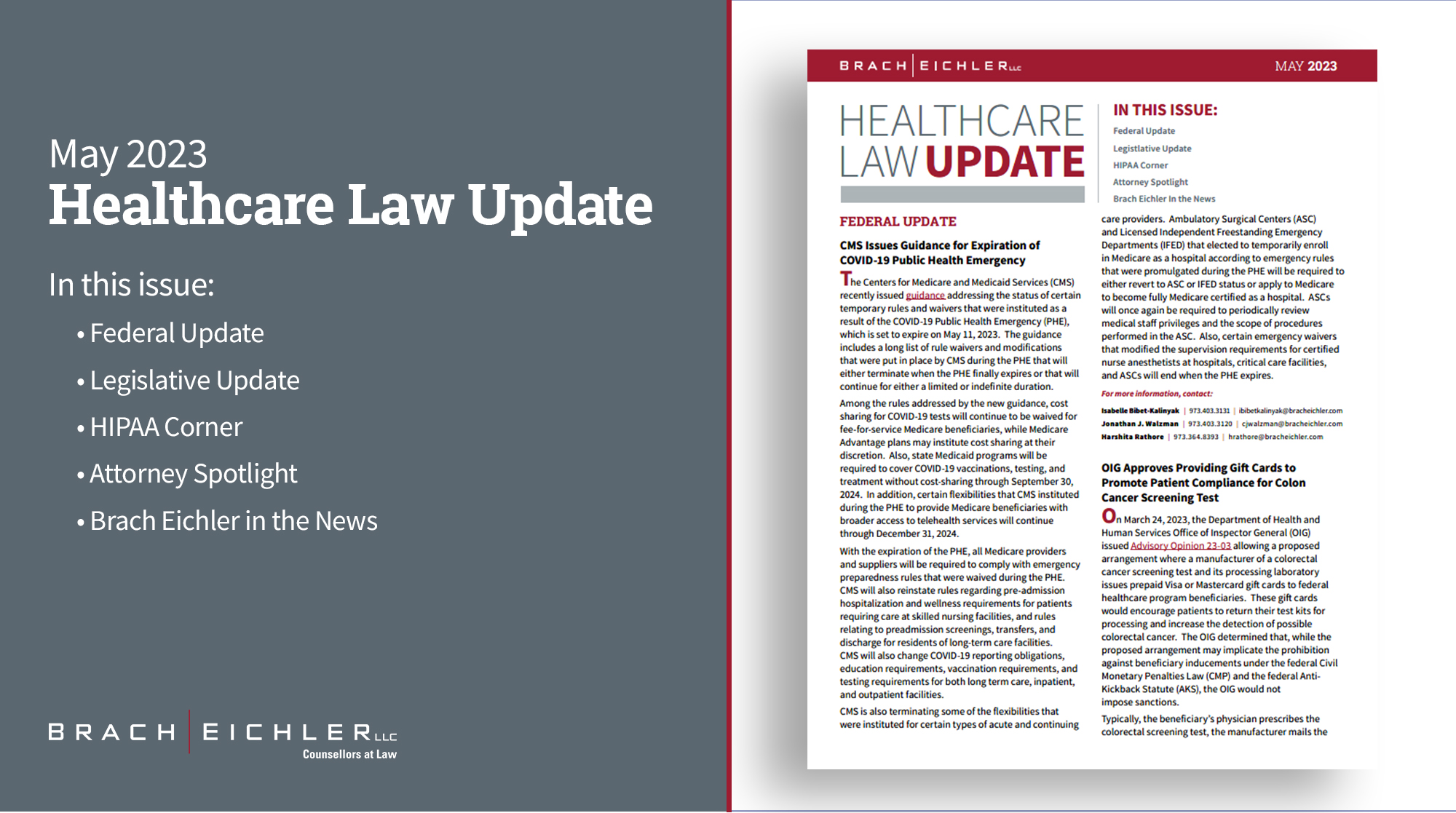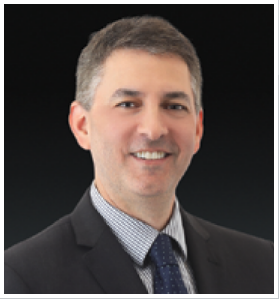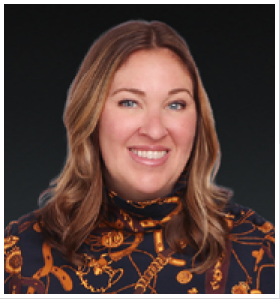
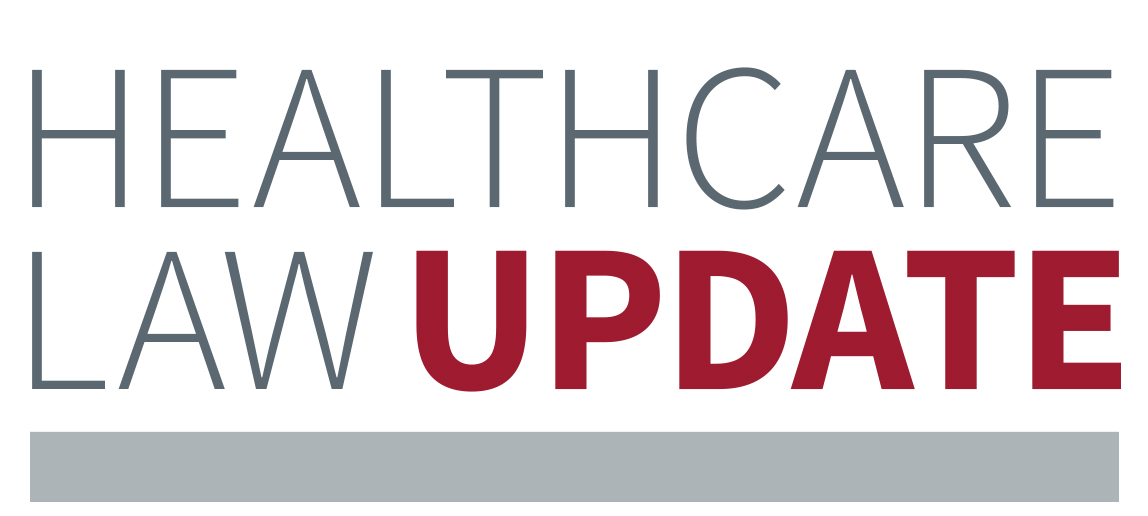
The Centers for Medicare and Medicaid Services (CMS) recently issued guidance addressing the status of certain temporary rules and waivers that were instituted as a result of the COVID-19 Public Health Emergency (PHE), which is set to expire on May 11, 2023. The guidance includes a long list of rule waivers and modifications that were put in place by CMS during the PHE that will either terminate when the PHE finally expires or that will continue for either a limited or indefinite duration.
Among the rules addressed by the new guidance, cost sharing for COVID-19 tests will continue to be waived for fee-for-service Medicare beneficiaries, while Medicare Advantage plans may institute cost sharing at their discretion. Also, state Medicaid programs will be required to cover COVID-19 vaccinations, testing, and treatment without cost-sharing through September 30, 2024. In addition, certain flexibilities that CMS instituted during the PHE to provide Medicare beneficiaries with broader access to telehealth services will continue through December 31, 2024.
With the expiration of the PHE, all Medicare providers and suppliers will be required to comply with emergency preparedness rules that were waived during the PHE. CMS will also reinstate rules regarding pre-admission hospitalization and wellness requirements for patients requiring care at skilled nursing facilities, and rules relating to preadmission screenings, transfers, and discharge for residents of long-term care facilities. CMS will also change COVID-19 reporting obligations, education requirements, vaccination requirements, and testing requirements for both long term care, inpatient, and outpatient facilities.
CMS is also terminating some of the flexibilities that were instituted for certain types of acute and continuing
care providers. Ambulatory Surgical Centers (ASC) and Licensed Independent Freestanding Emergency Departments (IFED) that elected to temporarily enroll in Medicare as a hospital according to emergency rules that were promulgated during the PHE will be required to either revert to ASC or IFED status or apply to Medicare to become fully Medicare certified as a hospital. ASCs will once again be required to periodically review medical staff privileges and the scope of procedures performed in the ASC. Also, certain emergency waivers that modified the supervision requirements for certified nurse anesthetists at hospitals, critical care facilities, and ASCs will end when the PHE expires.
For more information, contact:
Isabelle Bibet-Kalinyak | 973.403.3131 | ibibetkalinyak@bracheichler.com
Jonathan J. Walzman | 973.403.3120 | cjwalzman@bracheichler.com
Harshita Rathore | 973.364.8393 | hrathore@bracheichler.com
On March 24, 2023, the Department of Health and Human Services Office of Inspector General (OIG) issued Advisory Opinion 23-03 allowing a proposed arrangement where a manufacturer of a colorectal cancer screening test and its processing laboratory issues prepaid Visa or Mastercard gift cards to federal healthcare program beneficiaries. These gift cards would encourage patients to return their test kits for processing and increase the detection of possible colorectal cancer. The OIG determined that, while the proposed arrangement may implicate the prohibition against beneficiary inducements under the federal Civil Monetary Penalties Law (CMP) and the federal Anti-Kickback Statute (AKS), the OIG would not impose sanctions.
Typically, the beneficiary’s physician prescribes the colorectal screening test, the manufacturer mails the
test kit to the beneficiary’s home, and the beneficiary collects the stool sample and returns the test kit for processing. Under the proposed arrangement, if the test kit is not received within a certain period of time, the laboratory will send a final reminder indicating that, if the laboratory receives the sample promptly, the laboratory will send the beneficiary a Visa or Mastercard gift card of up to $75. First, the OIG determined that the gift card would not violate the CMP because “remuneration” under that law excludes incentives to beneficiaries that promote the delivery of preventive care. Second, the OIG found that the gift card presented a minimal risk of fraud and abuse under the AKS because it is unlikely to lead to overutilization of services, encourages patient compliance, and includes additional safeguards. The safeguards include: advising beneficiaries that the gift card may not be used for items or services provided by the laboratory, each beneficiary would be limited to one gift card in a 36-month period, and there would be no advertisement of the arrangement to prescribers or beneficiaries.

This opinion is consistent with other advisory opinions relating to gift card arrangements to federal health care program beneficiaries and shows that the OIG is poised to address all types of gift card programs. Healthcare providers interested in developing gift card arrangements for patients should carefully consider OIG’s analysis of such arrangements.
For more information, contact:
Carol Grelecki | 973.403.3140 | cgrelecki@bracheichler.com
Edward J. Yun | 973.364.5229 | eyun@bracheichler.com
Sally Olson | 973.403.3102 | solson@bracheichler.com
On April 20, 2023, the Department of Justice (DOJ) criminally charged eighteen defendants with COVID-19 healthcare fraud schemes. The schemes resulted in $490 million in false billing to federal programs and theft from federally funded pandemic programs. Defendants charged by the DOJ include:
• A lab owner allegedly added claims for respiratory pathogen panel tests, even though ordering providers and facility administrators did not want or need them.
• A doctor allegedly submitted over 70 fraudulent loan applications through the Paycheck Protection Program and Economic Injury Disaster Loan (EIDL) Program and obtained over $3 million in loan funds.
• A doctor and a marketer allegedly purchased Medicare beneficiary identification numbers and shipped COVID-19 over-the-counter tests to beneficiaries who did not request the tests, causing over $8.4 million in claims to Medicare.
• Three medical professionals at a small midwife practice allegedly distributed nearly 2,700 forged COVID-19 vaccination record cards to individuals who were not vaccinated.
For more information, contact:
Riza I. Dagli | 973.403.3103 | rdagli@bracheichler.com
Caroline J. Patterson | 973.403.3141 | cpatterson@bracheichler.com
Cynthia J. Liba | 973.403.3106 | cliba@bracheichler.com
An independent arbitration panel recently awarded $91,270,257.00 to Envision Healthcare (Envision), a private equity-backed national medical group and physician services company, in its arbitration against UnitedHealthcare (UHC) for underpayment for essential medical care. While Envision has other lawsuits against UHC that are still pending, the award stems from UHC’s unilateral reduced reimbursement to Envision clinicians in violation of the parties in-network agreement. In response to Envision’s lawsuit, UHC claimed that it had approached Envision before litigation about alleged upcoding and deceptive practices regarding emergency care provided by Envision and that Envision responded by rushing the subject lawsuit and filing first to beat UHC to the courthouse. The arbitration panel ultimately decided in favor of Envision.
In 2021, UHC was involved in a similar dispute with TeamHealth Holdings (TeamHealth), in which UHC alleged that TeamHealth engaged in fraud by billing for over-inflated medical codes to get greater reimbursement. TeamHealth countersued against UHC, alleging that the insurer’s shared savings plan encouraged the underpayment or termination of physician contracts. Ultimately, a Nevada, jury agreed with TeamHealth and awarded them $60 Million, finding that UHC engaged in unfair reimbursement practices by deliberately failing to pay frontline emergency room doctors adequately for care provided to patients.
For more information, contact:
Keith J. Roberts | 973.364.5201 | kroberts@bracheichler.com
Jonathan J. Walzman | 973.403.3120 | cjwalzman@bracheichler.com
Paul DeMartino, Jr. | 973.364.5228 | pdemartino@bracheichler.com
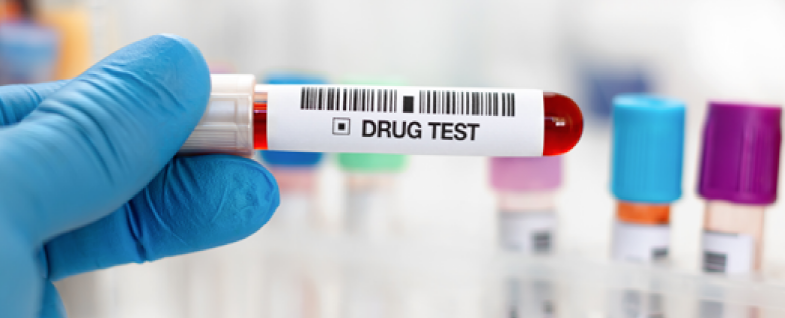
Genotox Laboratories Ltd., of Austin, Texas, agreed to pay approximately $5.9 million to resolve False Claims Act allegations that from 2014 to 2020 it paid volume-based commissions to third-party marketers in violation of the Anti-Kickback Statute and submitted claims to federal health care programs for unnecessary drug tests.
The Department of Health and Human Services Office of Inspector General (OIG) alleged that Genotox paid kickbacks to independent contractor sales representatives and marketing firms to arrange for or recommend the ordering of Genotox’s laboratory testing, in violation of the Anti-Kickback Statute. Specifically, the independent contractors were paid a percentage of the revenue Genotox received from billing Medicare, the Railroad Retirement Board (RRB), and TRICARE for laboratory testing orders facilitated or arranged for by those contractors.
The OIG also alleged that Genotox submitted claims to
Medicare, RRB, and TRICARE for laboratory tests that were not covered and/or not reasonable and necessary, including blanket orders and routine standing orders of drug testing for all patients in a provider’s practice. Specifically, Genotox offered health care providers order forms known as “custom profiles”for each provider to pre-select the tests to order, which Genotox then performed and billed, for all or nearly all of the provider’s patients, generally at the highest reimbursement categories, such as definitive drug testing for 22 or more drug classes.
In connection with the settlement, Genotox entered into a five-year Corporate Integrity Agreement (CIA) with the OIG. The CIA requires, among other things, that Genotox maintain a compliance program, implement a risk assessment program, and hire an Independent Review Organization to review Medicare and Medicaid claims submitted by Genotox.
For more information, contact:
John D. Fanburg, Chair | 973.403.3107 | jfanburg@bracheichler.com
Caroline J. Patterson | 973.403.3141 | cpatterson@bracheichler.com
Cynthia J. Liba | 973.403.3106 | cliba@bracheichler.com
On March 22, 2023, CMS issued updated guidance for home dialysis services performed in a skilled nursing facility or nursing home. The updated guidance emphasizes having written agreements outlining arrangements between an End Stage Renal Dialysis (ESRD) facility and a nursing home and provides that an agreement establishes a connection between both entities and fosters accountability that is vital to patient health and the success of the care plan. The revised guidance also clarifies that the ESRD facility should collaborate with the nursing home to develop and implement protocols for the delivery of dialysis services, and to the extent possible, ensure that nursing home dialysis patients are provided the same standard of care as dialysis patients receiving treatments in a dialysis facility. The updated guidance also covers qualifications and training of any dialysis administering personnel and coordination of care.
For more information, contact:
Isabelle Bibet-Kalinyak | 973.403.3131 | ibibetkalinyak@bracheichler.com
Caroline J. Patterson | 973.403.3141 | cpatterson@bracheichler.com
Vanessa Coleman | 973.364.5208 | vcoleman@bracheichler.com
MCR Health, Inc., a Federally Qualified Health Center in Florida, voluntarily agreed to resolve a disability discrimination complaint filed by an individual who is deaf and hard of hearing, alleging that MCR Health failed to provide her with auxiliary aids and services when she requested an interpreter for her husband’s post-surgical medical appointment. As part of the agreement, MCR Health agreed to provide auxiliary aids and services to patients and companions who are deaf or hard of hearing, review its policies, document assessments, create an auxiliary aid and service denial log, give primary consideration to requests from patients or companions who are deaf or hard of hearing, and train all staff to ensure effective communication with patients and companions.
For more information, contact:
Joseph M. Gorrell | 973.403.3112 | jgorrell@bracheichler.com
Caroline J. Patterson | 973.403.3141 | cpatterson@bracheichler.com
Vanessa Coleman | 973.364.5208 | vcoleman@bracheichler.com

The federal Stark Law and Anti-Kickback Statute (AKS), which prohibit physician self-referrals and kickbacks, have changed for calendar year 2023. Notably, there is a new Stark Law exception and an AKS safe harbor for healthcare entities offering mental health programs to physicians, which includes counseling, mental health services, suicide prevention, and substance use disorder programs. The new Stark Law exception for physician-focused mental health programs requires a written policy and must be offered by a healthcare
entity with a formal medical staff to all physicians in the geographic area served by the entity and without regard to the volume or value of referrals or other business generated by a physician for the entity. The new AKS safe harbor is similar to the Stark Law exception. However, the new AKS safe harbor also applies to non-physician clinicians, thereby permitting healthcare entities to provide mental health and behavioral health improvement or maintenance programs to physicians and other clinicians.
For more information, contact:
Caroline J. Patterson | 973.403.3141 | cpatterson@bracheichler.com
Jonathan J. Walzman | 973.403.3120 | cjwalzman@bracheichler.com
Vanessa Coleman | 973.364.5208 | vcoleman@bracheichler.com
Senate Bill 3733, introduced in the New Jersey Senate and General Assembly on March 20, 2023, would require Medicaid to cover the cost of medically necessary ovulation-enhancing drugs and associated medical services for individuals aged 21 to 44 experiencing infertility, subject to federal financial participation. Coverage for ovulation-enhancing drugs and medical services would be limited to three treatment cycles per beneficiary’s lifetime.
Assembly Bill 5305, introduced in the New Jersey General Assembly IN March 2023, would enter New Jersey into the Women’s Reproductive Health Care Compact, which requires member states to collaborate to prevent extradition or investigation of individuals or entities involved in providing or receiving reproductive health care services for women. The Bill would also mandate avoidance of record disclosure, negative licensing actions, malpractice insurance increases, and data collection on certain aspects of women seeking out-of-state reproductive health care services.
The Expanding Care in the Home Act, a federal bill which was introduced in the U.S. House of Representatives on April 25, 2023 aims to reduce care in hospitals and other
healthcare facilities and increase home-based care as a potential solution to Medicare’s financial problems. The legislation would create a new Medicare benefit that allows certain beneficiaries to have a home health worker for up to 12 hours a week, broaden reimbursement for home-based services, and tasks the Department of Health and Human Services with studying additional procedures that could be moved to the home-based setting. The Bill has garnered support from technology companies, insurers, venture capitalists, providers, and telehealth advocates. However, some health economists are skeptical about the proponents’ cost-saving claims, and question whether there is a sufficient workforce to implement the Bill’s purpose.

Assembly Bill 5259, introduced and referred to the Assembly Health Committee on February 28, 2023, would require the State Health Benefits Program (SHBP), the School Employees Health Benefits Program (SEHBP), the State Medicaid program, and the NJ FamilyCare program to provide coverage for anti-obesity medications for subscribers or enrollees. Health professionals would be able to prescribe anti-obesity medications for patients with obesity-related health problems that have not been mitigated by diet and exercise alone. These programs would cover anti-obesity medication when there is a diagnosis of obesity or an obesity-related medical condition; anti-obesity medication is prescribed; and the prescribed anti-obesity medication is dispensed by an approved pharmacy.
For more information, contact:
John D. Fanburg, Chair | 973.403.3107 | jfanburg@bracheichler.com
Edward Hilzenrath | 973.403.3114 | ehilzenrath@bracheichler.com
Vanessa Coleman | 973.364.5208 | vcoleman@bracheichler.com
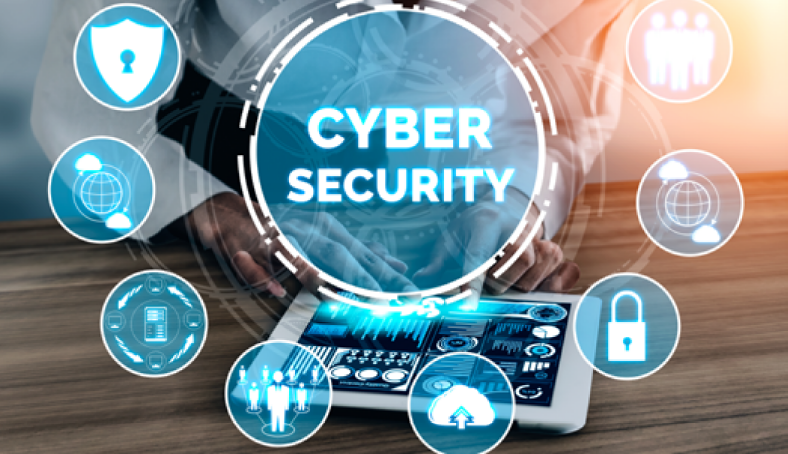
On April 17, 2023, the U.S. Department of Health and Human Services announced the release of various resources to assist the health and public health sector to address the ongoing and growing cybersecurity concerns in such industries. These include:
Knowledge on Demand – a new online cybersecurity educational platform designed to assist health care facilities of various sizes across the country and that offers free cybersecurity trainings to improve cybersecurity awareness. The trainings address the top five cybersecurity threats to the health and public health industry: social engineering, ransomware, loss or theft of equipment data, accidental, intentional or malicious data loss, and attacks against connected medical devices.
Health Industry Cybersecurity Practices (HICP) 2023 Edition – consensus-based best practices to strengthen an organization’s cybersecurity defenses against cyber threats, and designed for organizations of different sizes.
Hospital Cyber Resiliency Initiative Landscape Analysis – PDF – a multi-agency collaborative report on domestic hospitals’ current state of cybersecurity preparedness.
One of the goals of theses to help organizations in the health and public health sector, including health care providers of all types, to develop and implement cybersecurity “best practices” and not only meet regulatory requirements but stay ahead, as best as possible, of the growing market of national and international cyber threat actors.
For more information or assistance with your privacy and security program, contact:
Lani M. Dornfeld, CHPC | 973.403.3136 | ldornfeld@bracheichler.com
Get to know the faces and stories of the people behind the articles in each issue. This month, we invite you to meet Partner Edward Hilzenrath and Counsel Colleen Buontempo.
What advice can you share with a client who might need your services?
Don’t hesitate to ask questions. Healthcare law is complex. Business arrangements that may be legal in other industries may not be legal for health care companies due to self-referral and anti-kickback laws as well as corporate practice of medicine restrictions.
What are some best practices for healthcare clients?
Keep careful detailed records. Have robust compliance plans, policies and procedures in place, including HIPAA and cyber security.
What advice can you share with a client who might need your services?
Make sure you do your homework when looking for an attorney and find someone that truly focuses in that area of law. In PIP arbitration, there are very stringent rules that need to be followed or recovery may be barred. It is important to know someone that can navigate these rules with expertise and ease.
What are some best practices for healthcare clients?
Do not be afraid to follow up with any questions or concerns about prior legal advice given to your practice. The laws and regulations are ever changing, and sometimes they might be unaware of a change that needs to be addressed.

The following Brach Eichler Healthcare Law Members were named to the “2023 New Jersey Super Lawyers” list by Super Lawyers: Lani M. Dornfeld, John D. Fanburg, Joseph M. Gorrell, Carol Grelecki, and Keith J. Roberts. Shannon Carroll and Emily Harris were each named to the “NJ Rising Stars” list by Super Lawyers. Congratulations to all! *No aspect of this advertisement has been approved by the Supreme Court of New Jersey. Click here for the Awards and Honors Methodology.
On May 4, Labor and Employment Member Jay Sabin issued a Law Alert entitled “Saliva Testing Now Acceptable.”
On May 2, Healthcare Law Member Isabelle Bibet-Kalinyak discussed how doctors can limit exposure to criminal liability in Modern Healthcare, “How malpractice insurers are navigating abortion bans.”
Join us for the 12th Annual New Jersey Healthcare Market Review, September 28-29, 2023 at the Borgata Hotel Casino & Spa, Atlantic City, NJ! Connect with over 200 attendees comprised of hospital and ASC executives and stakeholders, physicians, practice owners/managers, and healthcare administrators. During this two-day event, industry experts will discuss timely topics and trends in the healthcare and legal space ranging from legislative issues to operating and business strategies for greater profitability. To learn more and register, please visit www.njhmr.com. For questions or additional information, please reach out to Ilana Schackman at ischackman@bracheichler.com.

Attorney Advertising: This publication is designed to provide Brach Eichler LLC clients and
contacts with information they can use to more effectively manage their businesses. The contents
of this publication are for informational purposes only. Neither this publication nor the lawyers who
authored it are rendering legal or other professional advice or opinions on specific facts or matters.
Brach Eichler LLC assumes no liability in connection with the use of this publication.

Shannon Carroll | 973.403.3126 | scarroll@bracheichler.com
Riza I. Dagli | 973.403.3103 | rdagli@bracheichler.com
Lani M. Dornfeld | 973.403.3136 | ldornfeld@bracheichler.com
John D. Fanburg, Chair | 973.403.3107 | jfanburg@bracheichler.com
Joseph M. Gorrell | 973.403.3112 | jgorrell@bracheichler.com
Carol Grelecki | 973.403.3140 | cgrelecki@bracheichler.com
Caroline J. Patterson | 973.403.3141 | cpatterson@bracheichler.com
Keith J. Roberts | 973.364.5201 | kroberts@bracheichler.com
Richard B. Robins | 973.447.9663 | rrobins@bracheichler.com
Jonathan J. Walzman | 973.403.3120 | jwalzman@bracheichler.com
Edward J. Yun | 973.364.5229 | eyun@bracheichler.com
Paul J. DeMartino, Jr. | 973.364.5228 | pdemartino@bracheichler.com
Emily J. Harris | 973.364.5205 | eharris@bracheichler.com
Cynthia J. Liba | 973.403.3106 | cliba@bracheichler.com
Sally Olson | 973.403.3102 | solson@bracheichler.com
Harshita Rathore | 973.364.8393 | hrathore@bracheichler.com
Roseland, NJ | New York, NY | West Palm Beach, FL | www.bracheichler.com | 973.228.5700


